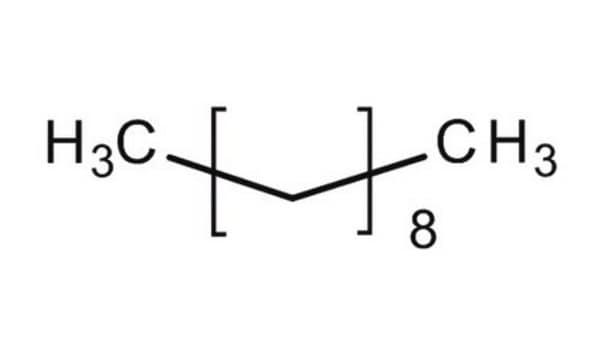About This Item
Recommended Products
vapor density
4.9 (vs air)
vapor pressure
1 mmHg ( 16.5 °C)
3.77 mmHg ( 37.7 °C)
Assay
≥95%
form
liquid
autoignition temp.
410 °F
expl. lim.
2.6 %
refractive index
n20/D 1.411 (lit.)
n20/D 1.412
bp
170.0-182.0 °C
174 °C (lit.)
mp
−30 °C (lit.)
density
0.730 g/mL at 20 °C
0.73 g/mL at 25 °C (lit.)
SMILES string
CCCCCCCCCC
InChI
1S/C10H22/c1-3-5-7-9-10-8-6-4-2/h3-10H2,1-2H3
InChI key
DIOQZVSQGTUSAI-UHFFFAOYSA-N
Looking for similar products? Visit Product Comparison Guide
General description
Application
Signal Word
Danger
Hazard Statements
Precautionary Statements
Hazard Classifications
Asp. Tox. 1 - Flam. Liq. 3
Supplementary Hazards
Storage Class Code
3 - Flammable liquids
WGK
WGK 1
Flash Point(F)
114.8 °F - closed cup
Flash Point(C)
46.0 °C - closed cup
Personal Protective Equipment
Certificates of Analysis (COA)
Search for Certificates of Analysis (COA) by entering the products Lot/Batch Number. Lot and Batch Numbers can be found on a product’s label following the words ‘Lot’ or ‘Batch’.
Already Own This Product?
Find documentation for the products that you have recently purchased in the Document Library.
Customers Also Viewed
Our team of scientists has experience in all areas of research including Life Science, Material Science, Chemical Synthesis, Chromatography, Analytical and many others.
Contact Technical Service









